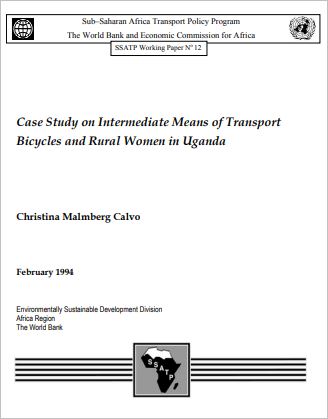Case Study on Intermediate Means of Transport: Bicycles and Rural Women in Uganda
Christina E. Malmberg Calvo

The present case study documents the use of bicycles in eastern Uganda where they are a means of generating income for rural traders and for urban poor who work as bicycle taxi-riders. It also assesses women's priorities regarding interventions to improve mobility and access, and the potential for greater use of bicycles by rural women and for women's activities.
The bicycle is the most common intermediate means of transport (IMT) in Sub-Saharan Africa (SSA), and it is used to improve the efficiency of productive tasks, and to serve as a link between farms and villages, nearby road networks, and market towns. The study indicates that the financial return on these activities is so high that the cost of the bicycle can be recovered in less than twelve months. It is further asserted that the main reason for the relatively small number of bicycle traders is the lack of credit.
The study highlights the general situation in SSA where IMT are predominantly owned and used by men and, where, for mainly cultural and economical reasons, women rarely get to use IMT for their transport needs.







